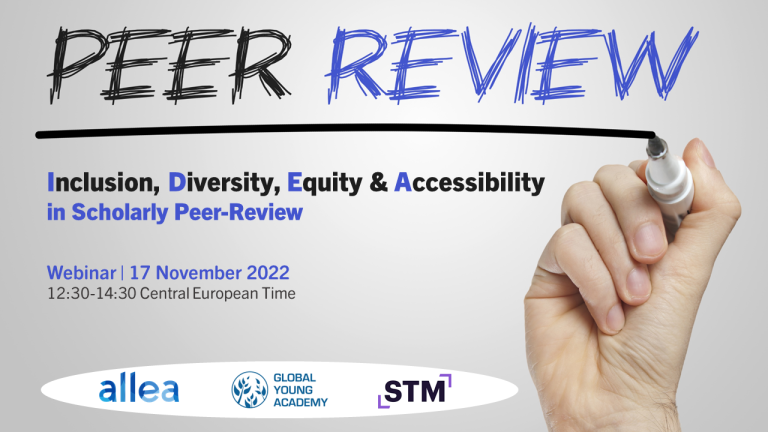Registration now open: ALLEA – GYA – STM joint webinar on Inclusion, Diversity, Equity and Accessibility in Scholarly Peer Review
What is it? – The second joint event by the GYA with ALLEA, the European Federation of Academies of Sciences and Humanities, and STM Publishers is scheduled for Thursday, 17 November 2022, from 11.30-13:30 UTC. The online webinar on ‘IDEA (Inclusion, Diversity, Equity and Accessibility) in scholarly peer-review’ will examine -and plan for- ways to expand Inclusion, Diversity, Equity and Accessibility in scholarly peer review.
Who should attend? – Academics, researchers, publishers, editors, funders, policymakers — anyone interested in advancing social justice within the global scholarly peer review system.
Why attend? – To learn more about the causes and consequences of issues surrounding IDEA (Inclusion, Diversity, Equity and Accessibility) in scholarly peer review. And – To exchange experiences regarding IDEA related challenges for peer reviewers and authors, help to identify gaps in the current system and to explore how biases can be better addressed.
In this upcoming joint webinar, we will explore issues related to Inclusion, Diversity, Equity and Accessibility in the scholarly peer review system. The peer review system currently does not accurately represent the research community as a whole: women, researchers from the Global South and less-established institutions, early career researchers, and non-native English speakers are all among those under-represented. In addition, researchers not affiliated with established high-status institutions often experience a disadvantage when their work is submitted for peer review. Together, these biases directly affect individuals’ career progression and are likely to impact the quality of research outputs and diversification of the research system in general.
A moderated discussion with four distinguished panellists will address these challenges and ideas for new, vigorous approaches to improve IDEA in peer review.
Some key questions that will be covered
- Structural biases in peer review; what causes and reinforces them?
- What are the consequences of such biases for individuals, the quality of research outputs, and the research ecosystem as a whole?
- How can we build a more diverse pool of reviewers, and what role can data on peer reviewers and authors support this?
- How can various peer review models promote – or impede – IDEA?
Panellists
Michael Barber, Emeritus Professor, Flinders University Australia, and a steering group member of the International Science Council’s Future of Scientific Publishing project
Haseeb Irfanullah, Consultant and part-time visiting fellow at University of Liberal Arts in Bangladesh
Pradeep Kumar, Personal Professor at University of the Witwatersrand, South Africa, and a member of the GYA
Nicole Nugent, Royal Society of Chemistry, Publishing Manager Quality and Ethics, and STM member
The panel will be moderated by Jessica Polka, Executive Director ASAPbio.
Register for the event here: https://www.stm-assoc.org/events/allea-gya-stm-joint-webinar/?register
About the organizers
In November 2020, ALLEA, GYA and STM convened two half-day discussion workshops about ”the future of peer review in scholarly communications” with a mix of invited representatives from the research community, research funders, universities, publishers, libraries, Open Science champions and trade bodies. The goal of the workshops was to bring together a wide variety of opinions and perspectives about the value, hurdles, unknowns, challenges and advantages that accompany peer review in a world that is rapidly and radically changing. A summary of discussions can be found here.
About ALLEA
ALLEA is the European Federation of Academies of Sciences and Humanities, representing more than 50 academies from over 40 EU and non-EU countries. Since its foundation in 1994, ALLEA speaks out on behalf of its members on the European and international stages, promotes science as a global public good, and facilitates scientific collaboration across borders and disciplines. Jointly with its members, ALLEA seeks to improve the conditions for research, to provide the best independent and interdisciplinary science advice available, and to strengthen the role of science in society. In doing so, ALLEA channels the expertise of European academies for the benefit of the research community, decision-makers and the public. ALLEA is constituted as a non-for-profit association and remains fully independent from political, religious, commercial or ideological interests.
Contact: Mathijs Vleugel, Scientific Policy Officer ()
About STM
At STM, we support our members in their mission to advance research worldwide. Our over 140 members based in more than 20 countries around the world collectively publish 66% of all journal articles and tens of thousands of monographs and reference works. As academic and professional publishers, learned societies, university presses, start-ups and established players, we work together to serve society by developing standards and technology to ensure research is of high quality, trustworthy and easy to access. We promote the contribution that publishers make to innovation, openness and the sharing of knowledge and embrace change to support the growth and sustainability of the research ecosystem. As a common good, we provide data and analysis for all involved in the global activity of research.
Contact: Barbara Kalumenos, Director Public Affairs ()
About the GYA
The vision of the GYA is science for all; science for the future, and its mission is to give a voice to young scientists and researchers around the world. The GYA, founded in 2010, is an independent science academy of 200 outstanding early- to mid-career researchers from six continents who are selected from across disciplines based on their academic excellence and commitment to engage with society. GYA members serve five-year terms, and the GYA presently counts members and alumni from 100 countries. The GYA administrative office is publicly funded and hosted at the German National Academy of Sciences Leopoldina. The wide array of GYA activities is supported by a range of international public and private funders.
